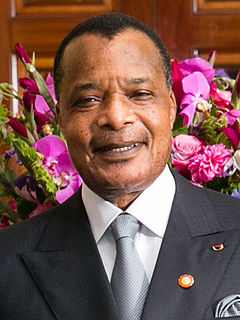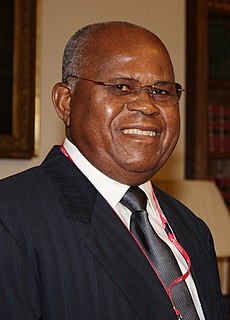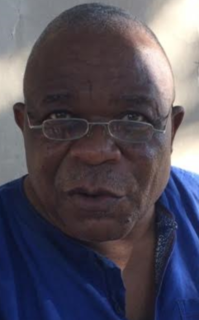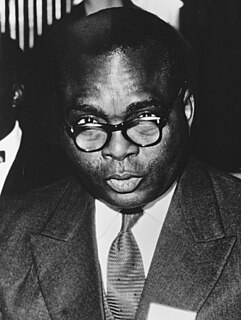Related Research Articles

Politics of the Democratic Republic of Congo take place in a framework of a republic in transition from a civil war to a semi-presidential republic.

Patrice Émery Lumumba was a Congolese politician and independence leader who served as the first Prime Minister of the independent Democratic Republic of the Congo from June until September 1960. He played a significant role in the transformation of the Congo from a colony of Belgium into an independent republic. Ideologically an African nationalist and pan-Africanist, he led the Congolese National Movement (MNC) party from 1958 until his assassination.

Denis Sassou Nguesso is a Congolese military and politician who has been President of the Republic of the Congo since 1997. He was previously president from 1979 to 1992. During his first period as president, he headed the Congolese Party of Labour (PCT) for 12 years. He introduced multiparty politics in 1990 and was then stripped of executive powers by the 1991 National Conference, remaining in office as a ceremonial head of state. He stood as a candidate in the 1992 presidential election but was defeated, placing third.

The Pan-African Union for Social Democracy is a political party in the Republic of the Congo headed by Pascal Lissouba, who was President from 1992 to 1997. It has been the country's main opposition party since Lissouba's ouster in 1997. Pascal Tsaty-Mabiala has been Secretary-General of UPADS since 2006.

Étienne Tshisekedi wa Mulumba was a Congolese politician and the leader of the Union for Democracy and Social Progress (UDPS), the main opposing political party in the Democratic Republic of the Congo (DRC). A long-time opposition leader, he served as Prime Minister of the country on three brief occasions: in 1991, 1992–1993, and 1997.
The Movement for the Liberation of the Congo is a political party in Democratic Republic of the Congo. Formerly a rebel group operating in the Democratic Republic of Congo that fought the government throughout the Second Congo War, it subsequently took part in the transitional government and is one of the main opposition parties.

André Ntsatouabantou Milongo was a Congolese politician who served as Prime Minister of the Republic of the Congo from June 1991 to August 1992. He was chosen by the 1991 National Conference to lead the country during its transition to multiparty elections, which were held in 1992. He was also the founder and President of the Union for Democracy and the Republic (UDR-Mwinda), a political party. From 1993 to 1997, he was President of the National Assembly, and he was again a deputy in the National Assembly from 2002 to 2007.

Vital Kamerhe is a Congolese politician who is the chief of staff of President Félix Tshisekedi and leader of the Union for the Congolese Nation (UNC) opposition party. Previously he was the President of the National Assembly of the Democratic Republic of the Congo from 2006 to 2009. After resigning from that office, he went into the opposition and founded the UNC. Kamerhe was a candidate in the 2011 presidential election. In 2018 Kamerhe supported Félix Tshisekedi for president and was made his chief of staff after the election.

Parliamentary elections were held in the Republic of the Congo in 1992, along with a presidential election, marking the end of the transition to multiparty politics. The election was held in two rounds, the first on 24 June 1992 and the second on 19 July 1992. The Pan-African Union for Social Democracy (UPADS)—led by Pascal Lissouba, who won the presidential election—won a plurality of seats (39), while the Congolese Movement for Democracy and Integral Development (MCDDI) of second place presidential candidate Bernard Kolélas won the second highest number of seats (29). Following in third place was the Congolese Labor Party (PCT), which had been the ruling party during single-party rule.

Moïse Katumbi Chapwe is a Congolese businessman and politician. He was Governor of Katanga Province, located in the southern part of the Democratic Republic of the Congo, from 2007 to September 2015. He was a member of the People's Party for Reconstruction and Democracy (PPRD) until September 2015. He has been described by The Economist as "probably the second most powerful man in the Democratic Republic of Congo after the president, Joseph Kabila". Jeune Afrique named him "African of the Year" in 2015.
The Rally for Democracy and Development is a political party in the Republic of the Congo. It has been one of the main participants in a coalition known as the African Socialist Movement-Congolese Progressive Party (MSA-PPC).
Jean-Pierre Thystère Tchicaya was a Congolese politician. He was briefly acting head of state of Congo-Brazzaville in February 1979 and was President of the National Assembly from 2002 to 2007. He also led a political party, the Rally for Democracy and Social Progress (RDPS), from 1990 to 2008.

Presidential elections were held in the Republic of the Congo on 12 July 2009. Long-time President Denis Sassou Nguesso won another seven-year term with a large majority of the vote, but the elections were marred by accusations of irregularities and fraud from the opposition; six opposition candidates chose to boycott the elections.
Pascal Tsaty Mabiala is a Congolese politician who has been the Secretary-General of the Pan-African Union for Social Democracy (UPADS) since 2006, as well as President of the UPADS Parliamentary Group since 2007. He stood as the UPADS candidate in the 2016 presidential election.
Guy Brice Parfait Kolélas was a Congolese politician. Following the death of his father, Bernard Kolélas, he succeeded him as Interim President of the Congolese Movement for Democracy and Integral Development (MCDDI), one of Congo-Brazzaville's main political parties, in 2010. He served in the government of Congo-Brazzaville as Minister of Marine and Inland Fishing from 2007 to 2009 and as Minister of the Civil Service from 2009 to 2015. After placing a distant second in the 2016 parliamentary election, he founded a new party, the Union of Humanist Democrats, in 2017.

Clément Miérassa is a Congolese politician who has been President of the Congolese Social Democratic Party (PSDC) since 1990. He served in the government of Congo-Brazzaville as Minister of Trade from 1991 to 1992 and as Minister of Industrial Development from 1992 to 1993. Miérassa was also a minor candidate in the 1992 presidential election as well as the 2009 presidential election.

General elections were held in the Democratic Republic of the Congo on 30 December 2018, to determine a successor to President Joseph Kabila, as well as for the 500 seats of the National Assembly and the 715 elected seats of the 26 provincial assemblies. Félix Tshisekedi (UDPS) won with 38.6% of the vote, defeating another opposition candidate, Martin Fayulu, and Emmanuel Ramazani Shadary, backed by the ruling party PPRD. Fayulu alleged that the vote was rigged against him in a deal made by Tshisekedi and outgoing President Kabila, challenging the result in the DRC's Constitutional Court. Different election observers, including those from the country's Roman Catholic Church, also cast doubt on the official result. Nonetheless on 20 January the Court rejected his appeal and declared Tshisekedi as the winner. Parties supporting President Kabila won the majority of seats in the National Assembly. Félix Tshisekedi was sworn in as the 5th President of the Democratic Republic of the Congo on 24 January 2019, making it the first peaceful transition of power in the country since it became independent from Belgium in 1960.

Jean Bolikango, later Bolikango Akpolokaka Gbukulu Nzete Nzube, was a Congolese educator, writer, and conservative politician. He served twice as Deputy Prime Minister of the Republic of the Congo, in September 1960 and from February to August 1962. Enjoying substantial popularity among the Bangala people, he headed the Parti de l'Unité Nationale and worked as a key opposition member in Parliament in the early 1960s.

Félix Antoine Tshisekedi Tshilombo is a Congolese politician who has been the President of the Democratic Republic of the Congo since 25 January 2019. He is the leader of the Union for Democracy and Social Progress (UDPS), the DRC's oldest and largest party, succeeding his late father Étienne Tshisekedi in that role, a three-time Prime Minister of Zaire and opposition leader during the reign of Mobutu Sese Seko. Tshisekedi was the UDPS party's candidate for president in the December 2018 general election, which he won, despite accusations of irregularities from several election monitoring organisations and other opposition parties. The Constitutional Court of the DRC upheld his victory after another opposition politician, Martin Fayulu, challenged the result, but Tshisekedi has been accused of making a deal with his predecessor, Joseph Kabila. The election marked the first peaceful transition of power since the state became independent from Belgium in 1960.
Paulin Makaya is a politician born in 1966 in Brazzaville, Republic of the Congo. A former collaborator of Bernard Kolélas, he was the founding president of “United for the Congo”, an opposition party.
References
- ↑ Ross, Aaron (13 September 2014). "Congo opposition pledges more protests after government crackdown". Reuters . Retrieved 21 July 2015.
- ↑ "Democracy behind bars: 11 opposition leaders facing jail or death". The Guardian . 27 March 2015. Retrieved 21 July 2015.
- ↑ "Early day motion 389 - JEAN-BERTRAND EWANGA". Parliament.uk. Retrieved 21 July 2015.
- ↑ https://ensemble-mk.com/organisation